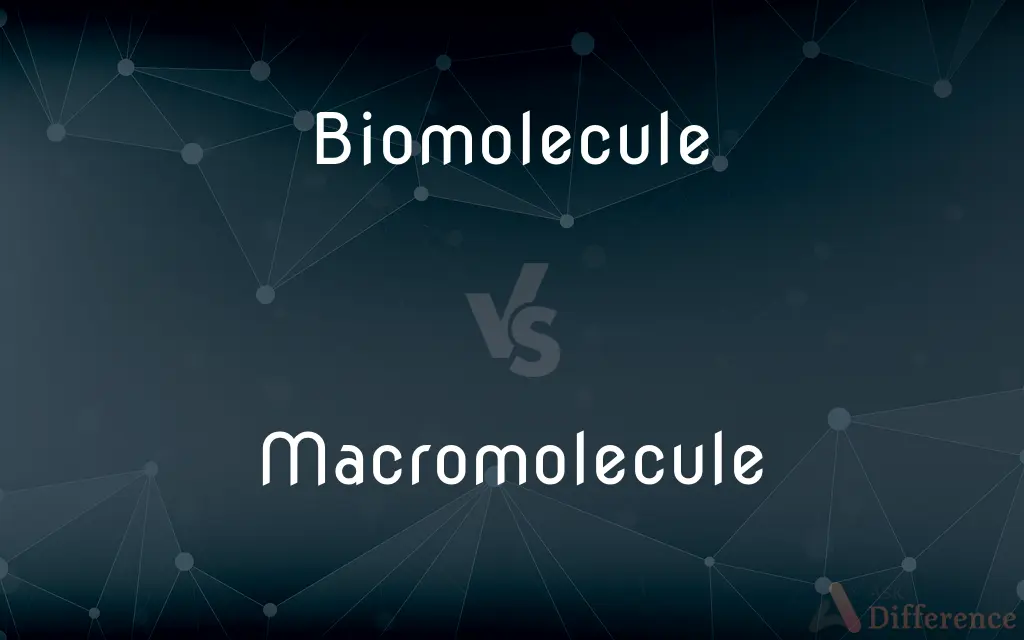Biomolecule vs. Macromolecule — What's the Difference?
By Urooj Arif & Maham Liaqat — Updated on March 25, 2024
Biomolecules are organic molecules in living organisms, while macromolecules are large molecules that can be biomolecules or synthetic.

Difference Between Biomolecule and Macromolecule
Table of Contents
ADVERTISEMENT
Key Differences
Biomolecules are organic molecules essential for life, playing critical roles in cellular structure and function. These include proteins, nucleic acids, carbohydrates, and lipids, which are involved in processes like metabolism, genetic information storage, and energy storage. On the other hand, macromolecules refer to large molecules that can be either biological (biomolecules) or synthetic, like plastics and synthetic fibers.
While all biomolecules are organic and found in living organisms, not all macromolecules are organic or found in living systems. Macromolecules include a broader category that encompasses both biological molecules and those synthesized for industrial, technological, and research purposes.
Biomolecules are characterized by their role in biological systems, where they are synthesized by living organisms and participate in processes essential for life. In contrast, macromolecules can be engineered or synthesized in laboratories, expanding beyond the scope of biological functions to include materials like polymers used in everyday products.
The study of biomolecules is fundamental to understanding biological processes and life at a molecular level, including how organisms obtain energy, reproduce, and maintain homeostasis. Conversely, the study of macromolecules, including synthetic ones, is crucial in fields such as materials science, engineering, and nanotechnology, where they are used to develop new materials and technologies.
Biomolecules are typically classified based on their structure and function within living organisms, such as proteins for structure and enzymes, and nucleic acids for genetic information. Macromolecules, however, are classified based on their chemical composition and properties, which can vary widely, from natural polymers like cellulose to synthetic polymers like polyethylene.
ADVERTISEMENT
Comparison Chart
Nature
Organic, found in living organisms
Can be organic or synthetic
Examples
Proteins, nucleic acids, carbohydrates, lipids
Proteins, DNA, plastics, synthetic fibers
Role
Critical for life processes
Varied, including biological and industrial uses
Found in
Living organisms
Living organisms and synthetic materials
Study Importance
Essential for understanding biology
Important in biology, materials science, and engineering
Compare with Definitions
Biomolecule
Synthesized naturally by living organisms.
Enzymes, biomolecules, catalyze biochemical reactions in cells.
Macromolecule
Large molecules that may be biomolecules or synthetic polymers.
Polyethylene, a synthetic macromolecule, is widely used in plastic bags.
Biomolecule
Organic molecules that are vital components of living organisms.
Glucose is a biomolecule that provides energy for cellular processes.
Macromolecule
Can be found in biological systems or as man-made materials.
Starch, a natural macromolecule, serves as a food storage polymer in plants.
Biomolecule
Participates in the molecular processes of life, such as metabolism and genetics.
DNA, a biomolecule, carries genetic information crucial for inheritance.
Macromolecule
Includes both naturally occurring and industrially synthesized molecules.
Nylon, a synthetic macromolecule, is used in textiles and fabrics.
Biomolecule
Involved in the structure, function, and regulation of the body's cells and organs.
Hemoglobin, a biomolecule, is essential for transporting oxygen in the blood.
Macromolecule
Plays roles in various fields, from biology to materials science.
DNA, a biological macromolecule, is fundamental to genetics and biotechnology.
Biomolecule
Includes a diverse group of molecules like proteins, lipids, carbohydrates, and nucleic acids.
Lipids are biomolecules that form cellular membranes and store energy.
Macromolecule
Classified based on chemical composition and size, including polymers and complex assemblies.
Proteins, macromolecules made of amino acids, perform a wide range of functions in cells.
Biomolecule
A biomolecule or biological molecule is a loosely used term for molecules present in organisms that are essential to one or more typically biological processes, such as cell division, morphogenesis, or development. Biomolecules include large macromolecules (or polyanions) such as proteins, carbohydrates, lipids, and nucleic acids, as well as small molecules such as primary metabolites, secondary metabolites and natural products.
Macromolecule
A macromolecule is a very large molecule, such as a protein. They are composed of thousands of covalently bonded atoms.
Biomolecule
(biochemistry) molecules, such as amino acids, sugars, nucleic acids, proteins, polysaccharides, DNA, and RNA, that occur naturally in living organisms
Macromolecule
A very large molecule, such as a polymer or protein, consisting of many smaller structural units linked together. Also called supermolecule.
Macromolecule
A very large molecule, especially used in reference to large biological polymers (e.g. nucleic acids and proteins).
Macromolecule
A very large molecule, especially a polymer having from hundreds to many thousands of atoms, such as DNA, RNA, protein, polysaccharide, polyethylene, polycarbonate, etc.
Macromolecule
Any very large complex molecule; found only in plants and animals
Common Curiosities
What distinguishes a biomolecule from a macromolecule?
Biomolecules are organic and essential for life, whereas macromolecules can be either biological or synthetic.
Can a molecule be both a biomolecule and a macromolecule?
Yes, many biomolecules, like proteins and DNA, are also considered macromolecules due to their large size.
What are some examples of synthetic macromolecules?
Plastics like polyethylene and synthetic fibers like nylon are examples of synthetic macromolecules.
Why are macromolecules important in materials science?
They are used to develop new materials with specific properties for various applications, from packaging to technology.
Are all macromolecules found in living organisms?
No, while some macromolecules are biological, others are synthetic and not found in nature.
How do biomolecules contribute to cellular processes?
They act as enzymes, structural components, energy sources, and carriers of genetic information.
How do scientists study biomolecules?
Through disciplines like biochemistry and molecular biology, using techniques like microscopy and spectroscopy.
What is the impact of synthetic macromolecules on the environment?
They have diverse impacts, from pollution concerns with non-biodegradable plastics to benefits like medical advances.
How are biomolecules essential to life?
They play critical roles in cellular structure, function, and processes like metabolism and genetics.
Can macromolecules be designed for specific purposes?
Yes, especially synthetic ones, which can be engineered for desired properties and functions.
How do biomolecules vary among different organisms?
While many biomolecules are universal, their specific forms and functions can vary widely among organisms.
What role do synthetic macromolecules play in everyday life?
They are used in a wide range of products, from clothing and household items to medical devices and electronics.
What is the significance of the size of macromolecules?
Their large size allows for complex structures and functions, which are crucial in biological systems and materials science.
What advancements have been made in the study of macromolecules?
Advances include the synthesis of novel materials, understanding of biological mechanisms, and development of biocompatible materials.
How do biomolecules interact with each other in living organisms?
They interact through complex networks of biochemical reactions that sustain life processes.
Share Your Discovery

Previous Comparison
Strudel vs. Streusel
Next Comparison
Stamboul vs. IstanbulAuthor Spotlight
Written by
Urooj ArifUrooj is a skilled content writer at Ask Difference, known for her exceptional ability to simplify complex topics into engaging and informative content. With a passion for research and a flair for clear, concise writing, she consistently delivers articles that resonate with our diverse audience.
Co-written by
Maham Liaqat














































